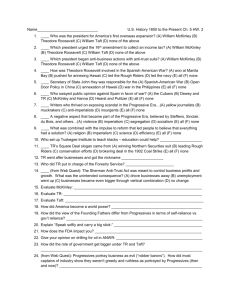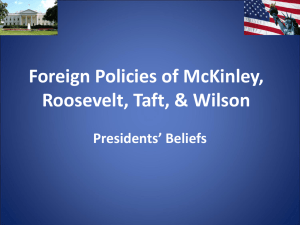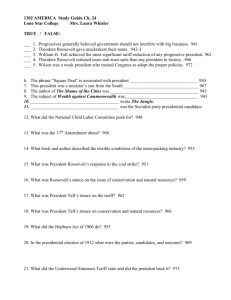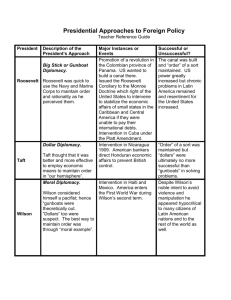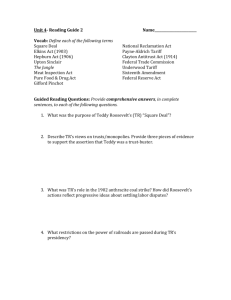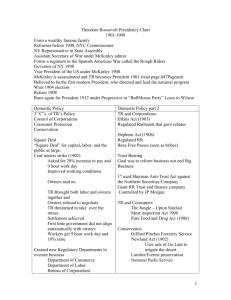Woodrow Wilson - Methacton School District
advertisement
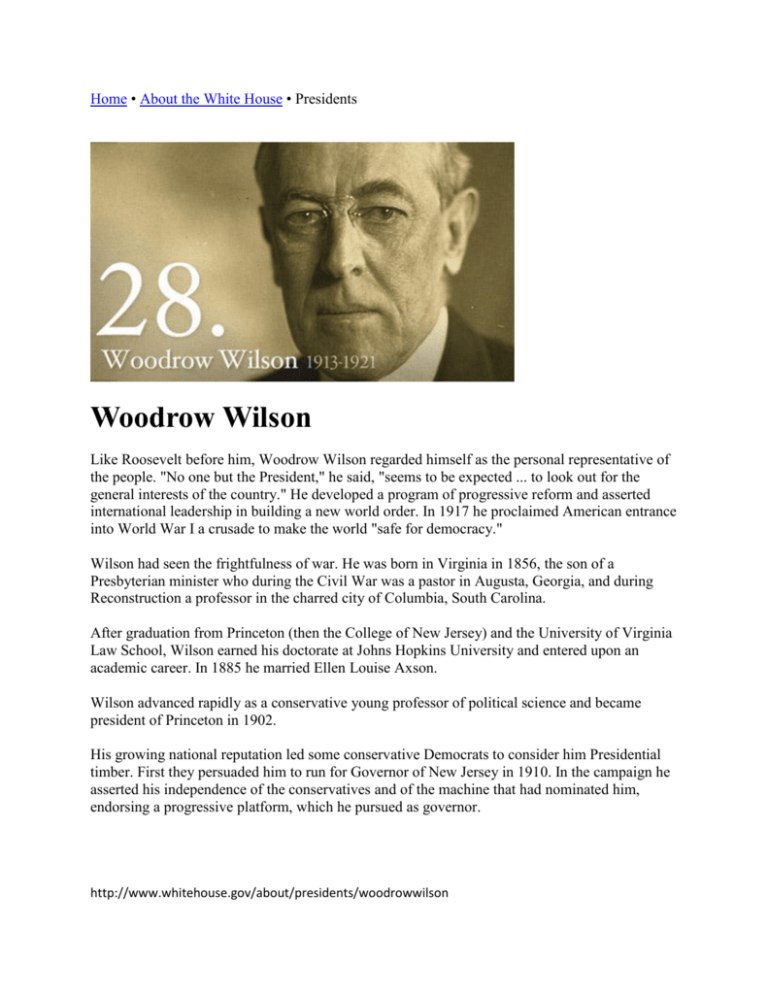
Home • About the White House • Presidents Woodrow Wilson Like Roosevelt before him, Woodrow Wilson regarded himself as the personal representative of the people. "No one but the President," he said, "seems to be expected ... to look out for the general interests of the country." He developed a program of progressive reform and asserted international leadership in building a new world order. In 1917 he proclaimed American entrance into World War I a crusade to make the world "safe for democracy." Wilson had seen the frightfulness of war. He was born in Virginia in 1856, the son of a Presbyterian minister who during the Civil War was a pastor in Augusta, Georgia, and during Reconstruction a professor in the charred city of Columbia, South Carolina. After graduation from Princeton (then the College of New Jersey) and the University of Virginia Law School, Wilson earned his doctorate at Johns Hopkins University and entered upon an academic career. In 1885 he married Ellen Louise Axson. Wilson advanced rapidly as a conservative young professor of political science and became president of Princeton in 1902. His growing national reputation led some conservative Democrats to consider him Presidential timber. First they persuaded him to run for Governor of New Jersey in 1910. In the campaign he asserted his independence of the conservatives and of the machine that had nominated him, endorsing a progressive platform, which he pursued as governor. http://www.whitehouse.gov/about/presidents/woodrowwilson He was nominated for President at the 1912 Democratic Convention and campaigned on a program called the New Freedom, which stressed individualism and states' rights. In the threeway election he received only 42 percent of the popular vote but an overwhelming electoral vote. Wilson maneuvered through Congress three major pieces of legislation. The first was a lower tariff, the Underwood Act; attached to the measure was a graduated Federal income tax. The passage of the Federal Reserve Act provided the Nation with the more elastic money supply it badly needed. In 1914 antitrust legislation established a Federal Trade Commission to prohibit unfair business practices. Another burst of legislation followed in 1916. One new law prohibited child labor; another limited railroad workers to an eight-hour day. By virtue of this legislation and the slogan "he kept us out of war," Wilson narrowly won re-election. But after the election Wilson concluded that America could not remain neutral in the World War. On April 2,1917, he asked Congress for a declaration of war on Germany. Massive American effort slowly tipped the balance in favor of the Allies. Wilson went before Congress in January 1918, to enunciate American war aims--the Fourteen Points, the last of which would establish "A general association of nations...affording mutual guarantees of political independence and territorial integrity to great and small states alike." After the Germans signed the Armistice in November 1918, Wilson went to Paris to try to build an enduring peace. He later presented to the Senate the Versailles Treaty, containing the Covenant of the League of Nations, and asked, "Dare we reject it and break the heart of the world?" But the election of 1918 had shifted the balance in Congress to the Republicans. By seven votes the Versailles Treaty failed in the Senate. The President, against the warnings of his doctors, had made a national tour to mobilize public sentiment for the treaty. Exhausted, he suffered a stroke and nearly died. Tenderly nursed by his second wife, Edith Bolling Galt, he lived until 1924. http://www.whitehouse.gov/about/presidents/woodrowwilson Home • About the White House • Presidents Theodore Roosevelt With the assassination of President McKinley, Theodore Roosevelt, not quite 43, became the youngest President in the Nation's history. He brought new excitement and power to the Presidency, as he vigorously led Congress and the American public toward progressive reforms and a strong foreign policy. He took the view that the President as a "steward of the people" should take whatever action necessary for the public good unless expressly forbidden by law or the Constitution." I did not usurp power," he wrote, "but I did greatly broaden the use of executive power." Roosevelt's youth differed sharply from that of the log cabin Presidents. He was born in New York City in 1858 into a wealthy family, but he too struggled--against ill health--and in his triumph became an advocate of the strenuous life. In 1884 his first wife, Alice Lee Roosevelt, and his mother died on the same day. Roosevelt spent much of the next two years on his ranch in the Badlands of Dakota Territory. There he mastered his sorrow as he lived in the saddle, driving cattle, hunting big game--he even captured an outlaw. On a visit to London, he married Edith Carow in December 1886. During the Spanish-American War, Roosevelt was lieutenant colonel of the Rough Rider Regiment, which he led on a charge at the battle of San Juan. He was one of the most conspicuous heroes of the war. http://www.whitehouse.gov/about/presidents/theodoreroosevelt Boss Tom Platt, needing a hero to draw attention away from scandals in New York State, accepted Roosevelt as the Republican candidate for Governor in 1898. Roosevelt won and served with distinction. As President, Roosevelt held the ideal that the Government should be the great arbiter of the conflicting economic forces in the Nation, especially between capital and labor, guaranteeing justice to each and dispensing favors to none. Roosevelt emerged spectacularly as a "trust buster" by forcing the dissolution of a great railroad combination in the Northwest. Other antitrust suits under the Sherman Act followed. Roosevelt steered the United States more actively into world politics. He liked to quote a favorite proverb, "Speak softly and carry a big stick. . . . " Aware of the strategic need for a shortcut between the Atlantic and Pacific, Roosevelt ensured the construction of the Panama Canal. His corollary to the Monroe Doctrine prevented the establishment of foreign bases in the Caribbean and arrogated the sole right of intervention in Latin America to the United States. He won the Nobel Peace Prize for mediating the Russo-Japanese War, reached a Gentleman's Agreement on immigration with Japan, and sent the Great White Fleet on a goodwill tour of the world. Some of Theodore Roosevelt's most effective achievements were in conservation. He added enormously to the national forests in the West, reserved lands for public use, and fostered great irrigation projects. He crusaded endlessly on matters big and small, exciting audiences with his high-pitched voice, jutting jaw, and pounding fist. "The life of strenuous endeavor" was a must for those around him, as he romped with his five younger children and led ambassadors on hikes through Rock Creek Park in Washington, D.C. Leaving the Presidency in 1909, Roosevelt went on an African safari, then jumped back into politics. In 1912 he ran for President on a Progressive ticket. To reporters he once remarked that he felt as fit as a bull moose, the name of his new party. While campaigning in Milwaukee, he was shot in the chest by a fanatic. Roosevelt soon recovered, but his words at that time would have been applicable at the time of his death in 1919: "No man has had a happier life than I have led; a happier life in every way." http://www.whitehouse.gov/about/presidents/theodoreroosevelt Home • About the White House • Presidents William Howard Taft Distinguished jurist, effective administrator, but poor politician, William Howard Taft spent four uncomfortable years in the White House. Large, jovial, conscientious, he was caught in the intense battles between Progressives and conservatives, and got scant credit for the achievements of his administration. Born in 1857, the son of a distinguished judge, he graduated from Yale, and returned to Cincinnati to study and practice law. He rose in politics through Republican judiciary appointments, through his own competence and availability, and because, as he once wrote facetiously, he always had his "plate the right side up when offices were falling." But Taft much preferred law to politics. He was appointed a Federal circuit judge at 34. He aspired to be a member of the Supreme Court, but his wife, Helen Herron Taft, held other ambitions for him. His route to the White House was via administrative posts. President McKinley sent him to the Philippines in 1900 as chief civil administrator. Sympathetic toward the Filipinos, he improved the economy, built roads and schools, and gave the people at least some participation in government. President Roosevelt made him Secretary of War, and by 1907 had decided that Taft should be his successor. The Republican Convention nominated him the next year. http://www.whitehouse.gov/about/presidents/williamhowardtaft Taft disliked the campaign--"one of the most uncomfortable four months of my life." But he pledged his loyalty to the Roosevelt program, popular in the West, while his brother Charles reassured eastern Republicans. William Jennings Bryan, running on the Democratic ticket for a third time, complained that he was having to oppose two candidates, a western progressive Taft and an eastern conservative Taft. Progressives were pleased with Taft's election. "Roosevelt has cut enough hay," they said; "Taft is the man to put it into the barn." Conservatives were delighted to be rid of Roosevelt--the "mad messiah." Taft recognized that his techniques would differ from those of his predecessor. Unlike Roosevelt, Taft did not believe in the stretching of Presidential powers. He once commented that Roosevelt "ought more often to have admitted the legal way of reaching the same ends." Taft alienated many liberal Republicans who later formed the Progressive Party, by defending the Payne-Aldrich Act which unexpectedly continued high tariff rates. A trade agreement with Canada, which Taft pushed through Congress, would have pleased eastern advocates of a low tariff, but the Canadians rejected it. He further antagonized Progressives by upholding his Secretary of the Interior, accused of failing to carry out Roosevelt's conservation policies. In the angry Progressive onslaught against him, little attention was paid to the fact that his administration initiated 80 antitrust suits and that Congress submitted to the states amendments for a Federal income tax and the direct election of Senators. A postal savings system was established, and the Interstate Commerce Commission was directed to set railroad rates. In 1912, when the Republicans renominated Taft, Roosevelt bolted the party to lead the Progressives, thus guaranteeing the election of Woodrow Wilson. Taft, free of the Presidency, served as Professor of Law at Yale until President Harding made him Chief Justice of the United States, a position he held until just before his death in 1930. To Taft, the appointment was his greatest honor; he wrote: "I don't remember that I ever was President." http://www.whitehouse.gov/about/presidents/williamhowardtaft Home • About the White House • Presidents William McKinley At the 1896 Republican Convention, in time of depression, the wealthy Cleveland businessman Marcus Alonzo Hanna ensured the nomination of his friend William McKinley as "the advance agent of prosperity." The Democrats, advocating the "free and unlimited coinage of both silver and gold"--which would have mildly inflated the currency--nominated William Jennings Bryan. While Hanna used large contributions from eastern Republicans frightened by Bryan's views on silver, McKinley met delegations on his front porch in Canton, Ohio. He won by the largest majority of popular votes since 1872. Born in Niles, Ohio, in 1843, McKinley briefly attended Allegheny College, and was teaching in a country school when the Civil War broke out. Enlisting as a private in the Union Army, he was mustered out at the end of the war as a brevet major of volunteers. He studied law, opened an office in Canton, Ohio, and married Ida Saxton, daughter of a local banker. At 34, McKinley won a seat in Congress. His attractive personality, exemplary character, and quick intelligence enabled him to rise rapidly. He was appointed to the powerful Ways and Means Committee. Robert M. La Follette, Sr., who served with him, recalled that he generally "represented the newer view," and "on the great new questions .. was generally on the side of the public and against private interests." http://www.whitehouse.gov/about/presidents/williammckinley During his 14 years in the House, he became the leading Republican tariff expert, giving his name to the measure enacted in 1890. The next year he was elected Governor of Ohio, serving two terms. When McKinley became President, the depression of 1893 had almost run its course and with it the extreme agitation over silver. Deferring action on the money question, he called Congress into special session to enact the highest tariff in history. In the friendly atmosphere of the McKinley Administration, industrial combinations developed at an unprecedented pace. Newspapers caricatured McKinley as a little boy led around by "Nursie" Hanna, the representative of the trusts. However, McKinley was not dominated by Hanna; he condemned the trusts as "dangerous conspiracies against the public good." Not prosperity, but foreign policy, dominated McKinley's Administration. Reporting the stalemate between Spanish forces and revolutionaries in Cuba, newspapers screamed that a quarter of the population was dead and the rest suffering acutely. Public indignation brought pressure upon the President for war. Unable to restrain Congress or the American people, McKinley delivered his message of neutral intervention in April 1898. Congress thereupon voted three resolutions tantamount to a declaration of war for the liberation and independence of Cuba. In the 100-day war, the United States destroyed the Spanish fleet outside Santiago harbor in Cuba, seized Manila in the Philippines, and occupied Puerto Rico. "Uncle Joe" Cannon, later Speaker of the House, once said that McKinley kept his ear so close to the ground that it was full of grasshoppers. When McKinley was undecided what to do about Spanish possessions other than Cuba, he toured the country and detected an imperialist sentiment. Thus the United States annexed the Philippines, Guam, and Puerto Rico. In 1900, McKinley again campaigned against Bryan. While Bryan inveighed against imperialism, McKinley quietly stood for "the full dinner pail." His second term, which had begun auspiciously, came to a tragic end in September 1901. He was standing in a receiving line at the Buffalo Pan-American Exposition when a deranged anarchist shot him twice. He died eight days later. http://www.whitehouse.gov/about/presidents/williammckinley PRESIDENTIAL BIOGRAPHIES WORKSHEET MATCH the STATEMENT with the correct President A. William McKinley B. Theodore Roosevelt C. William Howard Taft D. Woodrow Wilson ____1. Civil War Participant ____2. Member of Congress ____3. Wanted to be a Supreme Court Justice ____4. Succeeded McKinley as President ____5. Youngest man to become President ____6. Rough Rider ____7. Candidate who was shot in the chest, but survived ____8. President of Princeton University ____9. Chief Executive of the Philippines ____10. “Make the world safe for Democracy” ____11. President from Ohio ____12. Annexed Philippines, Guam, and Puerto Rico during his administration ____13. Assassinated in 1901 at Buffalo Pan American Exposition ____14. President from New York ____15. “Speak softly but carry a big stick” ____16. Leader of Bull Moose Party ____17. Dollar Diplomacy ____18. Initiated 80 anti-trusts suits, Federal Income Tax, direct elections of senators ____19. President born in Virginia ____20. Governor of New Jersey ____21. Passed Federal Reserve Act during this administration ____22. Ran for Re-election on “he kept us out of war” ____23. Administration program was New Freedom ____24. Administration program was Square Deal ____25. Won Nobel Peace Prize ____26. Based Latin American Policy on Monroe Doctrine ____27. Panama Canal started in this administration Write a brief paragraph for each President summarizing their major accomplishments while in office.
